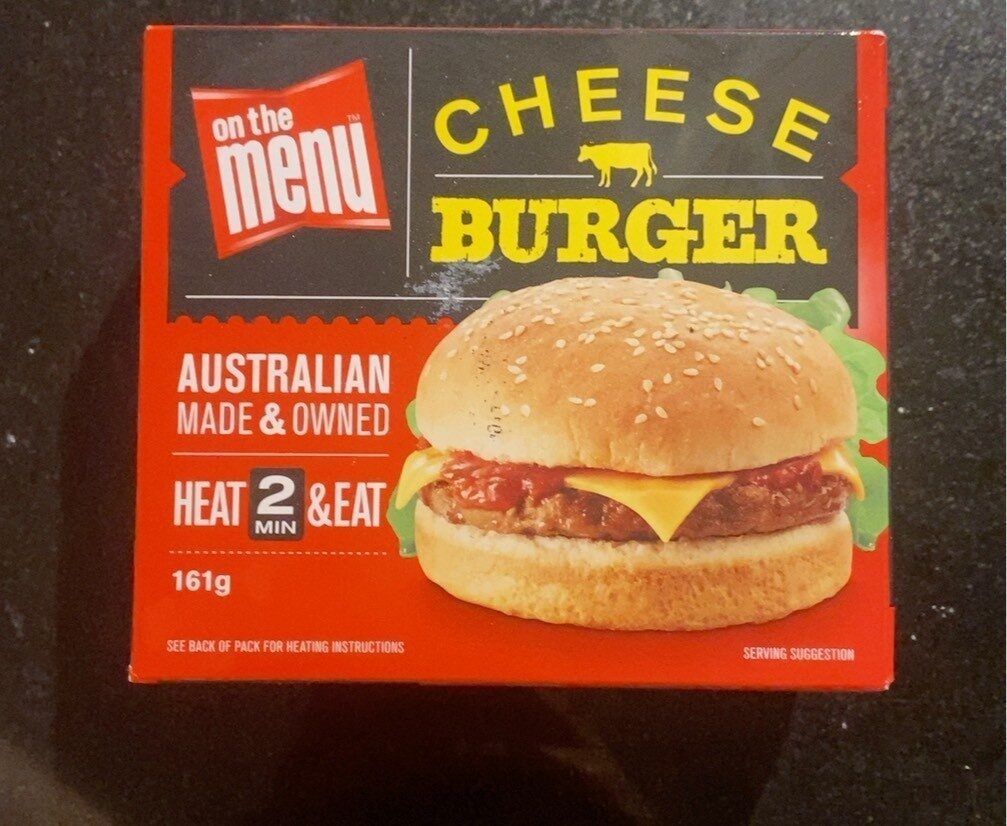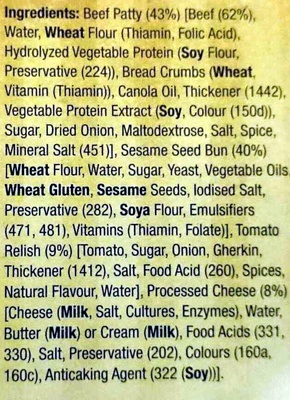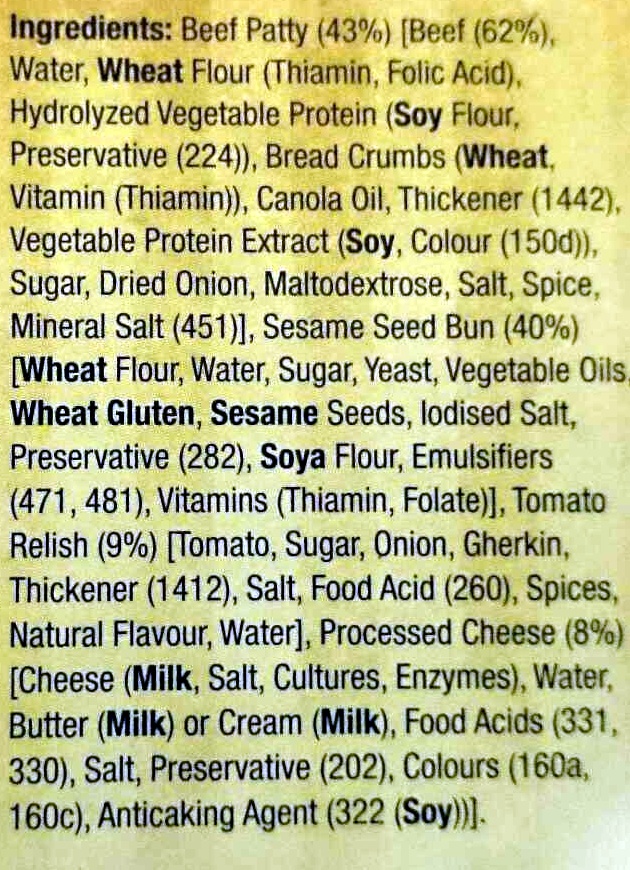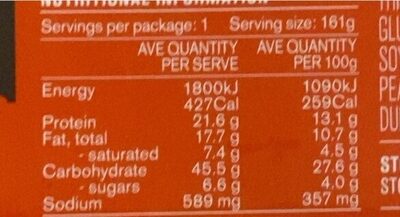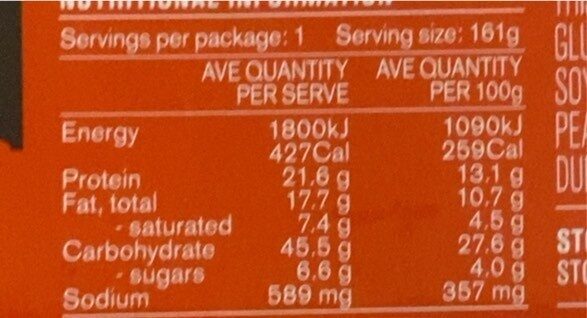Help us make food transparency the norm!
As a non-profit organization, we depend on your donations to continue informing consumers around the world about what they eat.
The food revolution starts with you!
Cheese burger - On the Menu - 161g
Cheese burger - On the Menu - 161g
This product page is not complete. You can help to complete it by editing it and adding more data from the photos we have, or by taking more photos using the app for Android or iPhone/iPad. Thank you!
×
Barcode: 9310761130269 (EAN / EAN-13)
Quantity: 161g
Brands: On the Menu
Categories: Sandwiches, Cheeseburgers, Frozen Snacks
Labels, certifications, awards: Australian made, Australian Made and Owned
Origin of ingredients: Australia
Manufacturing or processing places: Australia
Stores: Coles, Woolworths
Countries where sold: Australia
Matching with your preferences
Health
Ingredients
-
77 ingredients
Beef Patty (43%) [Beef (62%), Water, Wheat Flour (Thiamin, Folic Acid), Hydrolyzed Vegetable Protein (Soy Flour, Preservative (224)), Bread Crumbs (Wheat, Vitamin (Thiamin)), Canola Oil, Thickener (1442), Vegetable Protein Extract (Soy, Colour, (150d)), Sugar, Dried Onion, Maltodextrose, Salt, Spice, Mineral Salt, (451)], Sesame Seed Bun, (40%) [Wheat Flour, Water, Sugar, Yeast, Vegetable Oils, Wheat Gluten, Sesame Seeds, Iodised Salt, Preservative (282), Soya Flour, Emulsifiers (471,481), Vitamins (Thiamin, Folate)], Tomato Relish (9%) [Tomato, Sugar, Onion, Gherkin, Thickener (1412), Salt, Food Acid (260), Spices, Natural Flavour, Water], Processed Cheese (8%) [Cheese (Milk, Salt, cultures, Enzymes), Water, Butter (Milk) or Cream (Milk), Food Acids (331,330), Salt, Preservative (202), Colours (160a, 160c) Anticaking Agent (322 (Soy))].Allergens: Beef, Gluten, Milk, Sesame seeds, Soybeans
Food processing
-
Ultra processed foods
Elements that indicate the product is in the 4 - Ultra processed food and drink products group:
- Additive: E1412 - Distarch phosphate
- Additive: E1442 - Hydroxypropyl distarch phosphate
- Additive: E150d - Sulphite ammonia caramel
- Additive: E160a - Carotene
- Additive: E322 - Lecithins
- Additive: E451 - Triphosphates
- Additive: E471 - Mono- and diglycerides of fatty acids
- Additive: E481 - Sodium stearoyl-2-lactylate
- Ingredient: Colour
- Ingredient: Emulsifier
- Ingredient: Flavouring
- Ingredient: Gluten
- Ingredient: Thickener
Food products are classified into 4 groups according to their degree of processing:
- Unprocessed or minimally processed foods
- Processed culinary ingredients
- Processed foods
- Ultra processed foods
The determination of the group is based on the category of the product and on the ingredients it contains.
Additives
-
E1442 - Hydroxypropyl distarch phosphate
Hydroxypropyl distarch phosphate: Hydroxypropyl distarch phosphate -HDP- is a modified resistant starch. It is currently used as a food additive -INS number 1442-. It is approved for use in the European Union -listed as E1442-, the United States, Australia, Taiwan, and New Zealand.Source: Wikipedia
-
E160a - Carotene
Carotene: The term carotene -also carotin, from the Latin carota, "carrot"- is used for many related unsaturated hydrocarbon substances having the formula C40Hx, which are synthesized by plants but in general cannot be made by animals -with the exception of some aphids and spider mites which acquired the synthesizing genes from fungi-. Carotenes are photosynthetic pigments important for photosynthesis. Carotenes contain no oxygen atoms. They absorb ultraviolet, violet, and blue light and scatter orange or red light, and -in low concentrations- yellow light. Carotenes are responsible for the orange colour of the carrot, for which this class of chemicals is named, and for the colours of many other fruits, vegetables and fungi -for example, sweet potatoes, chanterelle and orange cantaloupe melon-. Carotenes are also responsible for the orange -but not all of the yellow- colours in dry foliage. They also -in lower concentrations- impart the yellow coloration to milk-fat and butter. Omnivorous animal species which are relatively poor converters of coloured dietary carotenoids to colourless retinoids have yellowed-coloured body fat, as a result of the carotenoid retention from the vegetable portion of their diet. The typical yellow-coloured fat of humans and chickens is a result of fat storage of carotenes from their diets. Carotenes contribute to photosynthesis by transmitting the light energy they absorb to chlorophyll. They also protect plant tissues by helping to absorb the energy from singlet oxygen, an excited form of the oxygen molecule O2 which is formed during photosynthesis. β-Carotene is composed of two retinyl groups, and is broken down in the mucosa of the human small intestine by β-carotene 15‚15'-monooxygenase to retinal, a form of vitamin A. β-Carotene can be stored in the liver and body fat and converted to retinal as needed, thus making it a form of vitamin A for humans and some other mammals. The carotenes α-carotene and γ-carotene, due to their single retinyl group -β-ionone ring-, also have some vitamin A activity -though less than β-carotene-, as does the xanthophyll carotenoid β-cryptoxanthin. All other carotenoids, including lycopene, have no beta-ring and thus no vitamin A activity -although they may have antioxidant activity and thus biological activity in other ways-. Animal species differ greatly in their ability to convert retinyl -beta-ionone- containing carotenoids to retinals. Carnivores in general are poor converters of dietary ionone-containing carotenoids. Pure carnivores such as ferrets lack β-carotene 15‚15'-monooxygenase and cannot convert any carotenoids to retinals at all -resulting in carotenes not being a form of vitamin A for this species-; while cats can convert a trace of β-carotene to retinol, although the amount is totally insufficient for meeting their daily retinol needs.Source: Wikipedia
-
E202 - Potassium sorbate
Potassium sorbate (E202) is a synthetic food preservative commonly used to extend the shelf life of various food products.
It works by inhibiting the growth of molds, yeast, and some bacteria, preventing spoilage. When added to foods, it helps maintain their freshness and quality.
Some studies have shown that when combined with nitrites, potassium sorbate have genotoxic activity in vitro. However, potassium sorbate is generally recognized as safe (GRAS) by regulatory authorities.
-
E224 - Potassium metabisulphite
Potassium metabisulfite: Potassium metabisulfite, K2S2O5, also known as potassium pyrosulfite, is a white crystalline powder with a pungent sulfur odour. The main use for the chemical is as an antioxidant or chemical sterilant. It is a disulfite and is chemically very similar to sodium metabisulfite, with which it is sometimes used interchangeably. Potassium metabisulfite is generally preferred out of the two as it does not contribute sodium to the diet. Potassium metabisulfite has a monoclinic crystal structure which decomposes at 190 °C, yielding potassium sulfite and sulfur dioxide: K2S2O5-s- → K2SO3-s- + SO2-g-Source: Wikipedia
-
E260 - Acetic acid
Acetic acid: Acetic acid , systematically named ethanoic acid , is a colorless liquid organic compound with the chemical formula CH3COOH -also written as CH3CO2H or C2H4O2-. When undiluted, it is sometimes called glacial acetic acid. Vinegar is no less than 4% acetic acid by volume, making acetic acid the main component of vinegar apart from water. Acetic acid has a distinctive sour taste and pungent smell. In addition to household vinegar, it is mainly produced as a precursor to polyvinyl acetate and cellulose acetate. It is classified as a weak acid since it only partially dissociates in solution, but concentrated acetic acid is corrosive and can attack the skin. Acetic acid is the second simplest carboxylic acid -after formic acid-. It consists of a methyl group attached to a carboxyl group. It is an important chemical reagent and industrial chemical, used primarily in the production of cellulose acetate for photographic film, polyvinyl acetate for wood glue, and synthetic fibres and fabrics. In households, diluted acetic acid is often used in descaling agents. In the food industry, acetic acid is controlled by the food additive code E260 as an acidity regulator and as a condiment. In biochemistry, the acetyl group, derived from acetic acid, is fundamental to all forms of life. When bound to coenzyme A, it is central to the metabolism of carbohydrates and fats. The global demand for acetic acid is about 6.5 million metric tons per year -Mt/a-, of which approximately 1.5 Mt/a is met by recycling; the remainder is manufactured from methanol. Vinegar is mostly dilute acetic acid, often produced by fermentation and subsequent oxidation of ethanol.Source: Wikipedia
-
E282 - Calcium propionate
Calcium propanoate: Calcium propanoate or calcium propionate has the formula Ca-C2H5COO-2. It is the calcium salt of propanoic acid.Source: Wikipedia
-
E322 - Lecithins
Lecithins are natural compounds commonly used in the food industry as emulsifiers and stabilizers.
Extracted from sources like soybeans and eggs, lecithins consist of phospholipids that enhance the mixing of oil and water, ensuring smooth textures in various products like chocolates, dressings, and baked goods.
They do not present any known health risks.
-
E330 - Citric acid
Citric acid is a natural organic acid found in citrus fruits such as lemons, oranges, and limes.
It is widely used in the food industry as a flavor enhancer, acidulant, and preservative due to its tart and refreshing taste.
Citric acid is safe for consumption when used in moderation and is considered a generally recognized as safe (GRAS) food additive by regulatory agencies worldwide.
-
E331 - Sodium citrates
Sodium citrate: Sodium citrate may refer to any of the sodium salts of citrate -though most commonly the third-: Monosodium citrate Disodium citrate Trisodium citrateThe three forms of the salt are collectively known by the E number E331. Sodium citrates are used as acidity regulators in food and drinks, and also as emulsifiers for oils. They enable cheeses to melt without becoming greasy.Source: Wikipedia
-
E451 - Triphosphates
Sodium triphosphate: Sodium triphosphate -STP-, also sodium tripolyphosphate -STPP-, or tripolyphosphate -TPP-,- is an inorganic compound with formula Na5P3O10. It is the sodium salt of the polyphosphate penta-anion, which is the conjugate base of triphosphoric acid. It is produced on a large scale as a component of many domestic and industrial products, especially detergents. Environmental problems associated with eutrophication are attributed to its widespread use.Source: Wikipedia
-
E471 - Mono- and diglycerides of fatty acids
Mono- and diglycerides of fatty acids (E471), are food additives commonly used as emulsifiers in various processed foods.
These compounds consist of glycerol molecules linked to one or two fatty acid chains, which help stabilize and blend water and oil-based ingredients. E471 enhances the texture and shelf life of products like margarine, baked goods, and ice cream, ensuring a smooth and consistent texture.
It is generally considered safe for consumption within established regulatory limits.
-
E481 - Sodium stearoyl-2-lactylate
Sodium stearoyl lactylate: Sodium stearoyl-2-lactylate -sodium stearoyl lactylate or SSL- is a versatile, FDA approved food additive used to improve the mix tolerance and volume of processed foods. It is one type of a commercially available lactylate. SSL is non-toxic, biodegradable, and typically manufactured using biorenewable feedstocks. Because SSL is a safe and highly effective food additive, it is used in a wide variety of products ranging from baked goods and desserts to pet foods.As described by the Food Chemicals Codex 7th edition, SSL is a cream-colored powder or brittle solid. SSL is currently manufactured by the esterification of stearic acid with lactic acid and partially neutralized with either food-grade soda ash -sodium carbonate- or caustic soda -concentrated sodium hydroxide-. Commercial grade SSL is a mixture of sodium salts of stearoyl lactylic acids and minor proportions of other sodium salts of related acids. The HLB for SSL is 10-12. SSL is slightly hygroscopic, soluble in ethanol and in hot oil or fat, and dispersible in warm water. These properties are the reason that SSL is an excellent emulsifier for fat-in-water emulsions and can also function as a humectant.Source: Wikipedia
Ingredients analysis
-
May contain palm oil
Ingredients that may contain palm oil: Vegetable oil
-
Non-vegan
Non-vegan ingredients: Beef, Cheese, Milk, Butter, CreamSome ingredients could not be recognized.
We need your help!
You can help us recognize more ingredients and better analyze the list of ingredients for this product and others:
- Edit this product page to correct spelling mistakes in the ingredients list, and/or to remove ingredients in other languages and sentences that are not related to the ingredients.
- Add new entries, synonyms or translations to our multilingual lists of ingredients, ingredient processing methods, and labels.
If you would like to help, join the #ingredients channel on our Slack discussion space and/or learn about ingredients analysis on our wiki. Thank you!
-
Non-vegetarian
Non-vegetarian ingredients: BeefSome ingredients could not be recognized.
We need your help!
You can help us recognize more ingredients and better analyze the list of ingredients for this product and others:
- Edit this product page to correct spelling mistakes in the ingredients list, and/or to remove ingredients in other languages and sentences that are not related to the ingredients.
- Add new entries, synonyms or translations to our multilingual lists of ingredients, ingredient processing methods, and labels.
If you would like to help, join the #ingredients channel on our Slack discussion space and/or learn about ingredients analysis on our wiki. Thank you!
-
Details of the analysis of the ingredients
We need your help!
Some ingredients could not be recognized.
We need your help!
You can help us recognize more ingredients and better analyze the list of ingredients for this product and others:
- Edit this product page to correct spelling mistakes in the ingredients list, and/or to remove ingredients in other languages and sentences that are not related to the ingredients.
- Add new entries, synonyms or translations to our multilingual lists of ingredients, ingredient processing methods, and labels.
If you would like to help, join the #ingredients channel on our Slack discussion space and/or learn about ingredients analysis on our wiki. Thank you!
: Beef Patty 43% (Beef 26.66%, Water, Wheat Flour (Thiamin, Folic Acid), Hydrolyzed Vegetable Protein (Soy Flour, Preservative (224)), Bread Crumbs (Wheat, Vitamin (Thiamin)), Canola Oil, Thickener (1442), Vegetable Protein (Soy, Colour (150d)), Sugar, Dried Onion, Maltodextrose, Salt, Spice, Mineral Salt (451)), Sesame Seed Bun (Wheat Flour, Water, Sugar, Yeast, Vegetable Oils, Wheat Gluten, Sesame Seeds, Iodised Salt, Preservative (282), Soya Flour, Emulsifiers (471‚481), vitamins, Thiamin, Folate), Tomato Relish 9% (Tomato, Sugar, Onion, Gherkin, Thickener (1412), Salt, Food Acid (260), Spices, Natural Flavour, Water), Processed Cheese 8% (Cheese (Milk, Salt, cultures, Enzymes), Water, Butter, Cream, Food Acids (331‚330), Salt, Preservative (202), Colours (160a, 160c), Anticaking Agent (322))- Beef Patty -> en:beef-patty - percent_min: 43 - percent: 43 - percent_max: 43
- Beef -> en:beef - vegan: no - vegetarian: no - percent_min: 26.66 - percent: 26.66 - percent_max: 26.66
- Water -> en:water - vegan: yes - vegetarian: yes - ciqual_food_code: 18066 - percent_min: 1.25692307692308 - percent_max: 16.34
- Wheat Flour -> en:wheat-flour - vegan: yes - vegetarian: yes - ciqual_proxy_food_code: 9410 - percent_min: 0 - percent_max: 14.3333333333333
- Thiamin -> en:thiamin - percent_min: 0 - percent_max: 14.3333333333333
- Folic Acid -> en:folic-acid - percent_min: 0 - percent_max: 7.16666666666667
- Hydrolyzed Vegetable Protein -> en:hydrolysed-vegetable-protein - vegan: yes - vegetarian: yes - percent_min: 0 - percent_max: 7.54153846153846
- Soy Flour -> en:soya-flour - vegan: yes - vegetarian: yes - ciqual_food_code: 20900 - percent_min: 0 - percent_max: 7.54153846153846
- Preservative -> en:preservative - percent_min: 0 - percent_max: 3.77076923076923
- 224 -> en:224 - percent_min: 0 - percent_max: 3.77076923076923
- Bread Crumbs -> en:breadcrumbs - vegan: maybe - vegetarian: maybe - ciqual_food_code: 7500 - percent_min: 0 - percent_max: 5.02769230769231
- Wheat -> en:wheat - vegan: yes - vegetarian: yes - ciqual_proxy_food_code: 9410 - percent_min: 0 - percent_max: 5.02769230769231
- Vitamin -> en:vitamins - vegan: yes - vegetarian: yes - percent_min: 0 - percent_max: 2.51384615384615
- Thiamin -> en:thiamin - percent_min: 0 - percent_max: 2.51384615384615
- Canola Oil -> en:canola-oil - vegan: yes - vegetarian: yes - from_palm_oil: no - percent_min: 0 - percent_max: 3.77076923076923
- Thickener -> en:thickener - percent_min: 0 - percent_max: 3.01661538461538
- 1442 -> en:1442 - percent_min: 0 - percent_max: 3.01661538461538
- Vegetable Protein -> en:plant-protein - vegan: yes - vegetarian: yes - percent_min: 0 - percent_max: 2.51384615384615
- Soy -> en:soya - vegan: yes - vegetarian: yes - percent_min: 0 - percent_max: 2.51384615384615
- Colour -> en:colour - percent_min: 0 - percent_max: 1.25692307692308
- 150d -> en:150d - percent_min: 0 - percent_max: 1.25692307692308
- Sugar -> en:sugar - vegan: yes - vegetarian: yes - ciqual_proxy_food_code: 31016 - percent_min: 0 - percent_max: 2.15472527472527
- Dried Onion -> en:dehydrated-onion - vegan: yes - vegetarian: yes - ciqual_food_code: 20180 - percent_min: 0 - percent_max: 1.88538461538462
- Maltodextrose -> en:maltodextrose - percent_min: 0 - percent_max: 1.67589743589744
- Salt -> en:salt - vegan: yes - vegetarian: yes - ciqual_food_code: 11058 - percent_min: 0 - percent_max: 0.91459627329192
- Spice -> en:spice - vegan: yes - vegetarian: yes - percent_min: 0 - percent_max: 0.91459627329192
- Mineral Salt -> en:mineral-salt - percent_min: 0 - percent_max: 0.91459627329192
- 451 -> en:451 - percent_min: 0 - percent_max: 0.91459627329192
- Sesame Seed Bun -> en:sesame-seed-bun - percent_min: 40 - percent_max: 40
- Wheat Flour -> en:wheat-flour - vegan: yes - vegetarian: yes - ciqual_proxy_food_code: 9410 - percent_min: 2.85714285714286 - percent_max: 40
- Water -> en:water - vegan: yes - vegetarian: yes - ciqual_food_code: 18066 - percent_min: 0 - percent_max: 20
- Sugar -> en:sugar - vegan: yes - vegetarian: yes - ciqual_proxy_food_code: 31016 - percent_min: 0 - percent_max: 4.0993788819876
- Yeast -> en:yeast - vegan: yes - vegetarian: yes - percent_min: 0 - percent_max: 4.0993788819876
- Vegetable Oils -> en:vegetable-oil - vegan: yes - vegetarian: yes - from_palm_oil: maybe - percent_min: 0 - percent_max: 4.0993788819876
- Wheat Gluten -> en:wheat-gluten - vegan: yes - vegetarian: yes - percent_min: 0 - percent_max: 4.0993788819876
- Sesame Seeds -> en:sesame-seeds - vegan: yes - vegetarian: yes - ciqual_food_code: 15010 - percent_min: 0 - percent_max: 4.0993788819876
- Iodised Salt -> en:iodised-salt - vegan: yes - vegetarian: yes - ciqual_food_code: 11058 - percent_min: 0 - percent_max: 0.91459627329192
- Preservative -> en:preservative - percent_min: 0 - percent_max: 0.91459627329192
- 282 -> en:282 - percent_min: 0 - percent_max: 0.91459627329192
- Soya Flour -> en:soya-flour - vegan: yes - vegetarian: yes - ciqual_food_code: 20900 - percent_min: 0 - percent_max: 0.91459627329192
- Emulsifiers -> en:emulsifier - percent_min: 0 - percent_max: 0.91459627329192
- 471‚481 -> en:471-481 - percent_min: 0 - percent_max: 0.91459627329192
- vitamins -> en:vitamins - vegan: yes - vegetarian: yes - percent_min: 0 - percent_max: 0.91459627329192
- Thiamin -> en:thiamin - percent_min: 0 - percent_max: 0.91459627329192
- Folate -> en:folate - percent_min: 0 - percent_max: 0.91459627329192
- Tomato Relish -> en:tomato-relish - percent_min: 9 - percent: 9 - percent_max: 9
- Tomato -> en:tomato - vegan: yes - vegetarian: yes - ciqual_food_code: 20047 - percent_min: 0.9 - percent_max: 9
- Sugar -> en:sugar - vegan: yes - vegetarian: yes - ciqual_proxy_food_code: 31016 - percent_min: 0 - percent_max: 4.0993788819876
- Onion -> en:onion - vegan: yes - vegetarian: yes - ciqual_food_code: 20034 - percent_min: 0 - percent_max: 3
- Gherkin -> en:gherkin - vegan: yes - vegetarian: yes - ciqual_proxy_food_code: 11004 - percent_min: 0 - percent_max: 2.25
- Thickener -> en:thickener - percent_min: 0 - percent_max: 1.8
- 1412 -> en:1412 - percent_min: 0 - percent_max: 1.8
- Salt -> en:salt - vegan: yes - vegetarian: yes - ciqual_food_code: 11058 - percent_min: 0 - percent_max: 0.91459627329192
- Food Acid -> en:food-acid - percent_min: 0 - percent_max: 0.91459627329192
- 260 -> en:260 - percent_min: 0 - percent_max: 0.91459627329192
- Spices -> en:spice - vegan: yes - vegetarian: yes - percent_min: 0 - percent_max: 0.91459627329192
- Natural Flavour -> en:natural-flavouring - vegan: maybe - vegetarian: maybe - percent_min: 0 - percent_max: 0.91459627329192
- Water -> en:water - vegan: yes - vegetarian: yes - ciqual_food_code: 18066 - percent_min: 0 - percent_max: 0.91459627329192
- Processed Cheese -> en:processed-cheese - percent_min: 8 - percent: 8 - percent_max: 8
- Cheese -> en:cheese - vegan: no - vegetarian: maybe - ciqual_proxy_food_code: 12999 - percent_min: 0.888888888888889 - percent_max: 8
- Milk -> en:milk - vegan: no - vegetarian: yes - ciqual_proxy_food_code: 19051 - percent_min: 0.222222222222222 - percent_max: 8
- Salt -> en:salt - vegan: yes - vegetarian: yes - ciqual_food_code: 11058 - percent_min: 0 - percent_max: 0.91459627329192
- cultures -> en:microbial-culture - vegan: maybe - vegetarian: maybe - percent_min: 0 - percent_max: 0.91459627329192
- Enzymes -> en:enzyme - vegan: maybe - vegetarian: maybe - percent_min: 0 - percent_max: 0.91459627329192
- Water -> en:water - vegan: yes - vegetarian: yes - ciqual_food_code: 18066 - percent_min: 0 - percent_max: 4
- Butter -> en:butter - vegan: no - vegetarian: yes - ciqual_proxy_food_code: 16400 - percent_min: 0 - percent_max: 2.66666666666667
- Cream -> en:cream - vegan: no - vegetarian: yes - ciqual_food_code: 19402 - percent_min: 0 - percent_max: 2
- Food Acids -> en:food-acids - percent_min: 0 - percent_max: 1.6
- 331‚330 -> en:331-330 - percent_min: 0 - percent_max: 1.6
- Salt -> en:salt - vegan: yes - vegetarian: yes - ciqual_food_code: 11058 - percent_min: 0 - percent_max: 0.91459627329192
- Preservative -> en:preservative - percent_min: 0 - percent_max: 0.91459627329192
- 202 -> en:202 - percent_min: 0 - percent_max: 0.91459627329192
- Colours -> en:colour - percent_min: 0 - percent_max: 0.91459627329192
- 160a -> en:160a - percent_min: 0 - percent_max: 0.91459627329192
- 160c -> en:160c - percent_min: 0 - percent_max: 0.45729813664596
- Anticaking Agent -> en:anti-caking-agent - percent_min: 0 - percent_max: 0.91459627329192
- 322 -> en:322 - percent_min: 0 - percent_max: 0.91459627329192
- Cheese -> en:cheese - vegan: no - vegetarian: maybe - ciqual_proxy_food_code: 12999 - percent_min: 0.888888888888889 - percent_max: 8
Nutrition
-
Poor nutritional quality
⚠ ️Warning: the amount of fiber is not specified, their possible positive contribution to the grade could not be taken into account.⚠ ️Warning: the amount of fruits, vegetables and nuts is not specified on the label, it was estimated from the list of ingredients: 6This product is not considered a beverage for the calculation of the Nutri-Score.
Positive points: 0
- Proteins: 5 / 5 (value: 13.416149068323, rounded value: 13.42)
- Fiber: 0 / 5 (value: 0, rounded value: 0)
- Fruits, vegetables, nuts, and colza/walnut/olive oils: 0 / 5 (value: 6.96955528846154, rounded value: 7)
Negative points: 11
- Energy: 3 / 10 (value: 1190, rounded value: 1190)
- Sugars: 0 / 10 (value: 4.0993788819876, rounded value: 4.1)
- Saturated fat: 4 / 10 (value: 4.5962732919255, rounded value: 4.6)
- Sodium: 4 / 10 (value: 365.838509316768, rounded value: 365.8)
The points for proteins are not counted because the negative points are greater or equal to 11.
Nutritional score: (11 - 0)
Nutri-Score:
-
Nutrient levels
-
Fat in moderate quantity (11%)
What you need to know- A high consumption of fat, especially saturated fats, can raise cholesterol, which increases the risk of heart diseases.
Recommendation: Limit the consumption of fat and saturated fat- Choose products with lower fat and saturated fat content.
-
Saturated fat in moderate quantity (4.6%)
What you need to know- A high consumption of fat, especially saturated fats, can raise cholesterol, which increases the risk of heart diseases.
Recommendation: Limit the consumption of fat and saturated fat- Choose products with lower fat and saturated fat content.
-
Sugars in low quantity (4.1%)
What you need to know- A high consumption of sugar can cause weight gain and tooth decay. It also augments the risk of type 2 diabetes and cardio-vascular diseases.
Recommendation: Limit the consumption of sugar and sugary drinks- Sugary drinks (such as sodas, fruit beverages, and fruit juices and nectars) should be limited as much as possible (no more than 1 glass a day).
- Choose products with lower sugar content and reduce the consumption of products with added sugars.
-
Salt in moderate quantity (0.915%)
What you need to know- A high consumption of salt (or sodium) can cause raised blood pressure, which can increase the risk of heart disease and stroke.
- Many people who have high blood pressure do not know it, as there are often no symptoms.
- Most people consume too much salt (on average 9 to 12 grams per day), around twice the recommended maximum level of intake.
Recommendation: Limit the consumption of salt and salted food- Reduce the quantity of salt used when cooking, and don't salt again at the table.
- Limit the consumption of salty snacks and choose products with lower salt content.
-
-
Nutrition facts
Nutrition facts As sold
for 100 g / 100 mlAs sold
per serving (161g `burger)Compared to: Cheeseburgers Energy 1,190 kj
(265 kcal)1,920 kj
(427 kcal)+8% Fat 10.994 g 17.7 g -13% Saturated fat 4.596 g 7.4 g -14% Carbohydrates 28.261 g 45.5 g +21% Sugars 4.099 g 6.6 g -1% Fiber ? ? Proteins 13.416 g 21.6 g +2% Salt 0.915 g 1.47 g -34% Fruits‚ vegetables‚ nuts and rapeseed‚ walnut and olive oils (estimate from ingredients list analysis) 6.97 % 6.97 %
Environment
-
Eco-Score E - Very high environmental impact
⚠ ️Select a country in order to include the full impact of transportation.The Eco-Score is an experimental score that summarizes the environmental impacts of food products.→ The Eco-Score was initially developped for France and it is being extended to other European countries. The Eco-Score formula is subject to change as it is regularly improved to make it more precise and better suited to each country.Life cycle analysis
-
Average impact of products of the same category: E (Score: 15/100)
Category: Cheeseburger, from fast foods restaurant
Category: Cheeseburger, from fast foods restaurant
- PEF environmental score: 1.78 (the lower the score, the lower the impact)
- including impact on climate change: 17.72 kg CO2 eq/kg of product
Stage Impact Agriculture
92.3 %Processing
3.3 %Packaging
1.0 %Transportation
0.9 %Distribution
0.5 %Consumption
1.9 %
Bonuses and maluses
-
Origins of ingredients with a medium impact
Bonus: +3
Environmental policy: +3
Transportation: 0
Origin of the product and/or its ingredients % of ingredients Impact Australia 100 %Medium
-
Packaging with a medium impact
Malus: -10
Shape Material Recycling Impact Box Unknown High ⚠ ️ The information about the packaging of this product is not sufficiently precise (exact shapes and materials of all components of the packaging).⚠ ️ For a more precise calculation of the Eco-Score, you can modify the product page and add them.
If you are the manufacturer of this product, you can send us the information with our free platform for producers.
Eco-Score for this product
-
Impact for this product: E (Score: 8/100)
Product: Cheese burger - On the Menu - 161g
Life cycle analysis score: 15
Sum of bonuses and maluses: -7
Final score: 8/100
-
Carbon footprint
-
Equal to driving 9.2 km in a petrol car
1772 g CO² per 100g of product
The carbon emission figure comes from ADEME's Agribalyse database, for the category: Cheeseburger, from fast foods restaurant (Source: ADEME Agribalyse Database)
Stage Impact Agriculture
94.7 %Processing
1.8 %Packaging
1.6 %Transportation
1.2 %Distribution
0.2 %Consumption
0.5 %
Packaging
-
Packaging with a medium impact
-
Packaging parts
Box
-
Packaging materials
Material % Packaging weight Packaging weight per 100 g of product
-
Transportation
-
Origins of ingredients
Origins of ingredients with a medium impact
Origin of the product and/or its ingredients % of ingredients Impact Australia 100 %Medium
Report a problem
-
Incomplete or incorrect information?
Category, labels, ingredients, allergens, nutritional information, photos etc.
If the information does not match the information on the packaging, please complete or correct it. Open Food Facts is a collaborative database, and every contribution is useful for all.
Data sources
Product added on by foodorigins
Last edit of product page on by packbot.
Product page also edited by ecoscore-impact-estimator, kiliweb, roboto-app, teolemon, yuka.sY2b0xO6T85zoF3NwEKvlmBDY_jQuB3kFT7Sn3XW5OvQKKblXet8zpjrNKg.

